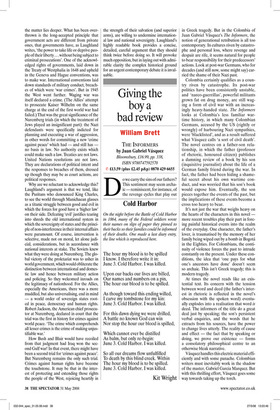Giving the boy a bad review
William Brett
THE INFORMERS by Juan Gabriel Vásquez Bloomsbury, £16.99, pp. 338, ISBN 9780747592570 ✆ £13.59 (plus £2.45 p&p) 0870 429 6655 Do we carry the sins of our fathers? This sentiment may seem archaic — reminiscent, for instance, of the revenge cycles that play out in Greek tragedy. But in the Colombia of Juan Gabriel Vásquez’s The Informers, the notion of generational retribution is all too contemporary. In cultures riven by catastrophe and personal loss, where revenge and despair are rife, it seems natural for people to bear responsibility for their predecessors’ actions. Look at post-war Germans, who for decades (and still now, some might say) carried the shame of their Nazi past.
Colombia certainly qualifies as a country riven by catastrophe. Its post-war politics have been consistently unstable, and ‘narco-guerrillas’, powerful militants grown fat on drug money, are still waging a form of civil war with an increasingly heavy-handed state. The Informers looks at Colombia’s less familiar wartime history, in which many Colombian Germans, accused by the US (rightly or wrongly) of harbouring Nazi sympathies, were ‘blacklisted’, and as a result suffered what Vásquez calls ‘a sort of civil death’. The novel centres on a father-son relationship, in which the father (professor of rhetoric, honoured citizen) publishes a damning review of a book by his son (inquisitive journalist) about the life of a German family friend during the war. In fact, the father had been hiding a shameful secret about his own wartime conduct, and was worried that his son’s book would expose him. Eventually, the son pieces together the events of the past, but the implications of these events become a cross too heavy to bear.
It’s not just the war that weighs heavy on the hearts of the characters in this novel — more recent troubles play their part in forcing painful historical events into the realm of the everyday. One character, the father’s lover, is traumatised by the memory of her family being wiped out by a bomb in Bogotá in the Eighties. For Colombians, the continuity of violence forces the past to intrude constantly on the present. Under these conditions, the idea that ‘one pays for what one’s ancestors have done’ doesn’t seem so archaic. This isn’t Greek tragedy; this is modern tragedy.
At times the novel reads like an existential text. Its concern with the tension between word and deed (the father’s interest in rhetoric is reflected in the novel’s obsession with the spoken word) eventually explodes into a realisation that word is deed. The informers of the title do a great deal just by speaking; the son’s persistent verbal enquiries, and the words that he extracts from his sources, have the power to change lives utterly. The reality of cause and effect — the fact that by speaking or doing, we prove our existence — forms a consolatory philosophical centre to an otherwise bleak narrative.
Vásquez handles this electric material efficiently and with some panache. Colombian writers must inevitably work in the shadow of the master, Gabriel Garcia Marquez. But with this thrilling effort, Vásquez goes some way towards taking up the torch.










































































 Previous page
Previous page